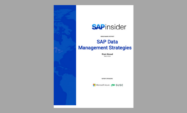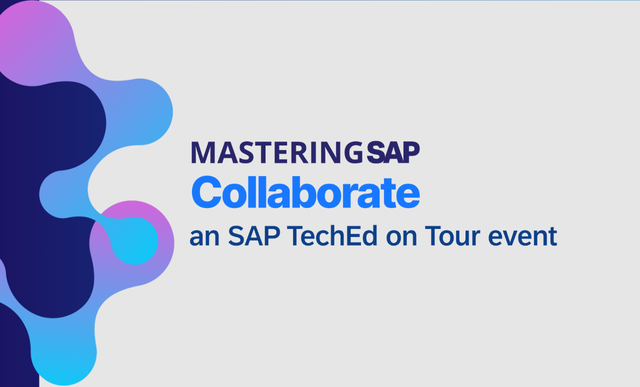SAP Data and Data Management
SAP BW | SAP BW/4HANA | SAP Crystal Reports | SAP Data Archiving | SAP Data Center | SAP Data Governance | SAP Data Integration | SAP Data Migration | SAP Data Quality | SAP Data Services | SAP Data Strategy | SAP Data Visualization | SAP Data Warehouse Cloud | SAP DMS | SAP Document Control | SAP EIM | SAP ETL | SAP ETL Tools | SAP HANA | SAP HANA Administration | SAP HANA Deployment Infrastructure | SAP HANA Studio | SAP Master Data | SAP Master Data Governance | SAP MDM
Filter By
Browse By
- SAP Analytics and AI
- SAP Application Development and Integration
- All SAP Application Development and Integration
- SAP ABAP
- SAP ABAP Development Tools
- SAP ABAP Test Cockpit
- SAP API Management
- SAP BAPI
- SAP Basis
- SAP BRF
- SAP Business Application Studio
- SAP CMS
- SAP Design Studio
- SAP Development Tools
- SAP DevOps
- SAP EAI
- SAP EDI
- SAP Extension Suite
- SAP Fiori
- SAP Fiori Elements
- SAP Integration Suite
- SAP Low Code Application Development
- SAP Low Code Automation
- SAP Netweaver
- SAP Release Management
- SAP UI5
- SAP Web Application Server
- SAP Web IDE
- SAP Business Process Management
- SAP Center of Excellence
- SAP CIO
- SAP Customer Experience
- SAP Data and Data Management
- All SAP Data and Data Management
- SAP BW
- SAP BW/4HANA
- SAP Crystal Reports
- SAP Data Archiving
- SAP Data Center
- SAP Data Governance
- SAP Data Integration
- SAP Data Migration
- SAP Data Quality
- SAP Data Services
- SAP Data Strategy
- SAP Data Visualization
- SAP Data Warehouse Cloud
- SAP DMS
- SAP Document Control
- SAP EIM
- SAP ETL
- SAP ETL Tools
- SAP HANA
- SAP HANA Administration
- SAP HANA Deployment Infrastructure
- SAP HANA Studio
- SAP Master Data
- SAP Master Data Governance
- SAP MDM
- SAP Enterprise Architect
- SAP Enterprise Asset Management
- SAP ERP
- SAP Finance
- All SAP Finance
- SAP Accounting
- SAP AR AP
- SAP Asset Accounting
- SAP Billing Systems
- SAP BPC
- SAP BRIM
- SAP Cash Management
- SAP Central Finance
- SAP Controlling
- SAP COPA
- SAP Cost Center Accounting
- SAP Currency Risk
- SAP e-invoicing
- SAP FICO
- SAP Finance Automation
- SAP Advanced Financial Closing
- SAP Financial Consolidation
- SAP Financial Planning
- SAP FX Risk
- SAP General Ledger
- SAP Global Tax Management
- SAP Hyperion
- SAP Order to Cash
- SAP Payment Processing
- SAP Profitability Analysis
- SAP Rebate Management
- SAP S/4HANA Finance
- SAP SWIFT Compliance
- SAP Treasury Management
- SAP Universal Journal
- SAP Governance Risk and Compliance
- SAP Human Capital Management
- SAP Intelligent Technologies
- SAP Platform and Technology
- All SAP Platform and Technology
- SAP Business Technology Platform
- SAP Cloud
- SAP Cloud Connector
- SAP Cloud Integration Platform
- SAP Cloud Migration
- SAP Cloud Platform
- SAP Cloud Providers
- SAP Cloud Strategy
- SAP Digital Signature
- SAP Container Platform
- SAP HANA Enterprise Cloud
- SAP Digital Asset Management
- SAP Smart Forms
- SAP HEC
- SAP Digital Integration Hub
- SAP Hyperscalers
- SAP Infrastructure
- SAP Messaging
- SAP Quality and Testing
- SAP Security
- SAP Spend Management
- SAP Supply Chain Management
- All SAP Supply Chain Management
- SAP APO
- SAP Asset Management
- SAP Business Network
- SAP Digital Manufacturing Cloud
- SAP Digital Twin
- SAP EWM
- SAP IBP
- SAP Inventory Management
- SAP Label Printing
- SAP Logistics
- SAP Manufacturing
- SAP Manufacturing Automation
- SAP MES
- SAP MII
- SAP MM
- SAP MRO
- SAP MRP
- SAP Order Management
- SAP Plant Maintenance
- SAP PLM
- SAP Production Planning
- SAP S&OP
- SAP SD
- SAP SPM
- SAP Supply Chain Planning
- SAP Track and Trace
- SAP Transportation Management
- SAP System Administration
What is SAP Data Management?
Data management is the systematic collection, organization, and retrieval of data to enhance productivity, efficiency, and informed decision-making. A robust data management strategy and a modern data management system are crucial for organizations regardless of their scale or industry.
What is SAP Data Management?
Data management is the systematic collection, organization, and retrieval of data to enhance productivity, efficiency, and informed decision-making. A robust data management strategy and a modern data management system are crucial for organizations regardless of their scale or industry.
The data management process comprises a comprehensive array of tasks and procedures, encompassing:
Data collection, processing, validation, and storage: Data is acquired, undergoes processing procedures, undergoes verification to ensure accuracy and reliability, and is then stored securely.
Integration of diverse data types: Data from various origins, both structured and unstructured, are consolidated and harmonized to provide a comprehensive and unified view.
Optimal data availability and recovery: Measures are implemented to maintain a high level of data accessibility, minimize downtime, and establish contingency plans to mitigate potential data loss due to unforeseen events.
Data governance: Protocols are established to regulate data usage and access by individuals and applications, ensuring compliance with relevant regulations, policies, and standards.
Data protection, security, and privacy: Stringent measures are employed to safeguard data integrity, prevent unauthorized access or breaches, and uphold data privacy principles.
Why is SAP Data Management Important for Enterprises?
Data plays a fundamental role in the operations and functioning of a business. Given the multitude of systems and technologies that underpin the interconnected global economies of today, businesses face the challenge of extracting meaningful insights from the vast amounts of data available to them. Therefore, data assumes a pivotal position in this context. Nevertheless, data in isolation holds no value; it is imperative for companies to adopt a comprehensive approach encompassing strategic planning, governance, and a robust data management framework. Such measures enable the effective utilization of diverse data types, empowering businesses to optimize their supply chains, engage with employee networks, enhance customer experiences, nurture partner ecosystems, and achieve various other objectives in a practical and efficient manner.
Big data is an asset: Big Data management is a valuable business asset. When equipped with the right tools, Big Data becomes a powerful resource, enabling companies to gain profound insights and make precise predictions. It facilitates a deeper understanding of customer preferences, enabling the delivery of exceptional experiences based on data-driven knowledge. Moreover, it drives the emergence of innovative business models reliant on real-time Internet of Things (IoT) and sensor data, unveiling opportunities that would otherwise remain hidden without the ability to analyze and interpret large-scale data.
Data is crucial for digital transformation: The significance of data and data-driven technologies has surged amidst the COVID-19 pandemic. Businesses are facing heightened demands to leverage their data effectively, enabling them to anticipate future developments, swiftly adapt, and incorporate resilience into their strategies and operational frameworks. The core element uniting all digital transformation initiatives is data. To embark on process optimization, embrace emerging technologies, and achieve organizational intelligence, businesses must establish a robust data infrastructure, which entails adopting a contemporary data management system.
Adherence to data privacy laws: Effective data management is crucial for both domestic and global data privacy regulations compliance, such as the General Data Protection Regulation (GDPR) and the California Consumer Privacy Act in the United States. Additionally, it is vital for meeting industry-specific privacy and security obligations. Establishing robust data management policies and procedures becomes indispensable when substantiating or undergoing audits to demonstrate adherence to these protective measures.
SAP Data Management Benefits
With SAP’s data management solutions, organizations can take command of their data. These solutions not only facilitate and streamline data migration and management during the transition to SAP S/4HANA but also provide the opportunity to acquire a unified and reliable perspective of data, along with dependable AI, analytics, and valuable insights. SAP data management solutions provide the following benefits:
- Seamless transition to SAP S/4HANA with data readiness.
- Enhanced data visibility, eliminate redundancy
- Valuable business insights generation from data
- Strategic decision-making by leveraging advanced analytics tools
- Optimized business processes with innovative redesign.
What is SAP Master Data Management?
Master data management (MDM) is the process of developing and maintaining a unified record or a single source of truth for individuals, locations, and entities within a business. This enables organizations to have a reliable, up-to-date perspective of critical data, which can be shared throughout the enterprise for improved reporting, decision-making, and streamlined operations. Some examples of master data include customer, supplier, location, product, and asset master data. Master Data Management (MDM) offers various benefits that are beyond decision-making and addressing key inquiries. Some of these advantages include:
Enhanced data accuracy: MDM resolves inconsistencies resulting from different teams entering the same information in varying formats, minimizing errors and duplications.
Improved analytics and data-driven decision-making: Accurate data is essential for generating reliable insights. MDM ensures that the data being analyzed is of high quality, leading to more informed decisions.
Streamlined business processes: Consistent and reliable master data facilitates the automation and acceleration of end-to-end business operations, such as lead to cash, source to pay, and design to operate.
Enhanced transparency and compliance with data privacy regulations: MDM aids in complying with data privacy regulations like GDPR by preventing fragmented data across different departments, ensuring transparency and compliance.
Simplified mergers and acquisitions: MDM enables a streamlined process for integrating and reconciling multiple data assets, facilitating efficient mergers and acquisitions.
What is SAP Master Data Governance?
The SAP Master Data Governance application enables centralized management of master data by leveraging a master data management layer built on the SAP Business Technology Platform. SAP Master Data Governance application enables efficient management of master data within the enterprise system landscape and offers domain-specific governance capabilities for master data that can be locally managed, consolidated or centrally created, modified, and distributed. Through seamless integration with other SAP solutions, it promotes the reuse of data models, business logic, and validation frameworks. Additionally, the application facilitates seamless integration with third-party products and services in your diverse technology stack. It also provides a cloud edition suitable for hybrid and cloud systems. SAP Master Data Governance allows:
- Consistent enterprise-wide data by consolidating and managing master data across the business, regardless of the platform (SAP or third-party solutions).
- Enhances the speed and accuracy of business processes and analytics through automated maintenance and distribution of master data, tighter data integration, and improved data quality and consistency.
- Simplifies compliance and reduces risk by implementing a governed master data process with auditable data, tracking data changes, and providing audit trails to comply with regulations such as International Financial Reporting Standards and Generally Accepted Accounting Principles.
- Lowers the overall cost of data ownership by supporting master data domains within a single application and enabling implementation in on-premise, cloud, or hybrid environments.
Join SAPinsider to access opportunities for networking and engagement in the dynamic SAP ecosystem. As a member, you will have access to a wealth of valuable resources and content tailored to SAP technologies and best practices like the latest research reports, articles, webinars, and events that will keep you informed and ahead of the curve.SAPinsider membership grants you exclusive access to in-depth analyses, expert insights, and practical guidance that will empower you to navigate the ever-evolving SAP landscape with ease. SAPinsider membership will enable you to remain one step ahead and harness the latest trends, innovations, and strategies to drive your own powerful digital transformations, optimize your SAP investments, and unlock business success.
245 results
-

“Data Streaming for SAP” App in the Cloud by SNP and Snowflake
Reading time: 1 mins
SNP, a renowned provider of SAP-centric digital transformation and data management solutions, launched their latest product, “Data Streaming for SAP”, at the Snowflake Summit in Las Vegas. This Snowflake Native App, available on the Snowflake Marketplace, offers a more streamlined way for organizations using SAP systems to securely and rapidly integrate their SAP data with…
-

TJC Group- How SAP Data Volume Management Contributes to Sustainability
Reading time: 1 min
Did you know data, growing at exponential rates, is one of IT’s hidden polluters? Today the digital economy accounts for 3 to 4% of the worldwide greenhouse gas emissions1. Is your organisation committed to reducing its carbon footprint? Find out how to keep your business sustainable in 2023. Download this Ebook to find out ways to reduce…
-

- SAP Data and Data Management
 Premium
Premium
Managing Data Migration in the Face of Current Data Residency Demands
Reading time: 3 mins
Organizations are growing more attentive to the whereabouts of their data. The expansion of the public cloud has had a substantial effect on data management. Due to concerns over data residency and sovereignty, certain businesses are now concluding that relying on the public cloud is not feasible. This poses a significant factor in intricate data…
-
-

Bramasol – Make Sense of Your Data and Escape Digital Debt with Convergent Mediation from Digital Route & SAP
With the rise of the Digital Solutions Economy (DSE), the seamless integration of end-to-end processes in the quote-to-cash cycle has never been more critical. A major challenge to achieving that goal is the often-disparate mix of legacy or specialized billing systems that need to feed into the rest of the DSE processes. SAP Convergent Mediation...…
-

- SAP Data and Data Management
 Premium
Premium
Taking Back Control of Your Unstructured Data
Reading time: 3 mins
Locating, storing, managing, and analyzing are only few of the challenges that organizations manage with unstructured data. While many enterprises are unaware of the origin of all their unstructured data, they need to adopt new approaches to control and optimize data management as it is crucial for increasing measurable corporate value. This article discusses how…
-

The Case for More Effective Data Management: New Report from HFS Research and Syniti
Reading time: 3 mins
As data management processes mature, many organizations still struggle with the quality of their data, according to new research conducted by HFS Research and Syniti, a global leader in enterprise data management. Over 300 senior-level executives from mid-size to large enterprises across various industries such as manufacturing, life sciences, healthcare, CPG, and retail were interviewed…
-

- SAP Data and Data Management
 Premium
Premium
Webinar: SAP Data Management Strategies
April 27, 2023
Data Management has become a top priority for business and IT teams alike. However, our most recent SAPInsider research shows that many organizations remain dissatisfied with their current data management strategies and the results. And there is no longer any time to procrastinate on this important issue as migrations to SAP S/4HANA, the cloud, and…
-
-

- SAP Data and Data Management
 Premium
Premium
Maximize the Value of Your Data for the Most Impactful Decisions
Click Here to View this Session Deck Data and analytics consistently ranks as a top area of investment for most organizations to support better decision-making. Most often the focus is on moving and transforming data to serve a new technology, rather than on the data where the value resides.... Membership Required You must be a…
-

A Data-First Recipe for a Successful SAP Journey
May 04, 2023
DATA IS THE LIFEBLOOD OF YOUR BUSINESS. It Drives your business revenue and product and contains valuable insights. SAP – data required to drive all business processes
-

- SAP Data and Data Management
 Premium
Premium
SAP Datasphere – An Introduction
Reading time: 4 mins
As enterprises adopt data-driven best practices and decisions, the quality of data plays a key role. As data is processed from multiple data sources, the business context to the data is typically lost. Without the right context, business queries on the dataset might not always return the best results, in turn hampering downstream data applications,…
Become a Member
Unlimited access to thousands of resources for SAP-specific expertise that can only be found here.
Become a Partner
Access exclusive SAP insights, expert marketing strategies, and high-value services including research reports, webinars, and buyers' guides, all designed to boost your campaign ROI by up to 50% within the SAP ecosystem.
Upcoming Events
-

Mastering SAP Collaborate, an SAP TechEd on Tour event
November 12 - 14, 2025
Sydney, New South Wales
Australia
View Event
Related Vendors
Your request has been successfully sent

